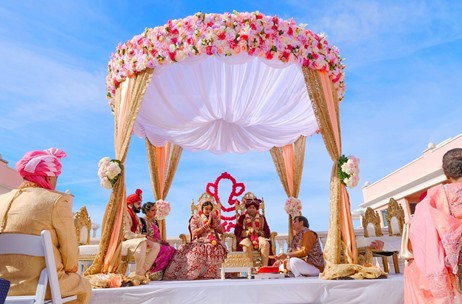Destination weddings have become a cherished trend in recent years, offering couples a unique opportunity to exchange vows in stunning, far-flung locations. From the colorful landscapes of India to the romantic allure of international destinations, planning a destination wedding involves much more than choosing the perfect venue and decor. Understanding the legal requirements and paperwork is essential to ensure your marriage is recognized and legitimate. In this comprehensive guide, we’ll explore the legal intricacies of planning a destination wedding, whether it’s within India or abroad.
Domestic Destination Weddings (India)
India, with its diverse landscapes and cultures, is a popular destination wedding choice. However, Indian law has specific requirements for a marriage to be legally recognized:
Marriage Registration Act: In India, all marriages must be registered under the Marriage Registration Act, 2009. The ceremony must be held in accordance with the customs and traditions of the respective religion or community.
Notice of Marriage: Notify the marriage officer in your jurisdiction about your intention to marry. The notice is typically displayed publicly for a specified period before the marriage can take place.
Age and Consent: Ensure that both parties meet the legal age requirements for marriage (18 years for brides and 21 years for grooms) and provide proof of age and consent if applicable.
Witnesses: Have at least three witnesses present at the wedding who can sign the marriage register.
Marriage Certificate: After the wedding, obtain a marriage certificate from the marriage officer. This certificate is proof of your legal marriage.
International Destination Weddings
Planning an international destination wedding adds complexity due to differing laws and regulations in each country. Here are the key considerations:
Legal Recognition: Research whether your international marriage will be recognized in your home country. Some countries may have specific requirements for recognizing marriages performed abroad.
Documentation: Check if your chosen destination requires specific documentation, such as visas, residency permits, or translated documents. Many countries also require an apostille–a certification that verifies the authenticity of documents.
Local Marriage Laws: Understand the marriage laws of the destination country, which can include waiting periods, blood tests, and age requirements. Consult with local authorities or legal experts to ensure compliance.
Officiant: Ensure that your chosen officiant is legally authorized to conduct weddings in the destination country. Some areas may require officiants to be registered or have specific credentials.
Cultural Sensitivity: Be respectful of local customs and traditions, as they may influence your wedding ceremony and legal requirements.
Destination weddings offer a unique and unforgettable experience, but they require meticulous planning to ensure legal recognition. A proficient wedding planner plays a pivotal role in ensuring that the legalities are met, allowing couples to focus on celebrating their love in the backdrop of their dream destination. With proper preparation and the right support, you can have the destination wedding you’ve always envisioned, whether it’s in the vibrant landscapes of India or a far-off international locale.
Understanding the legal requirements and paperwork is essential to ensure your marriage is recognized and legitimate.

